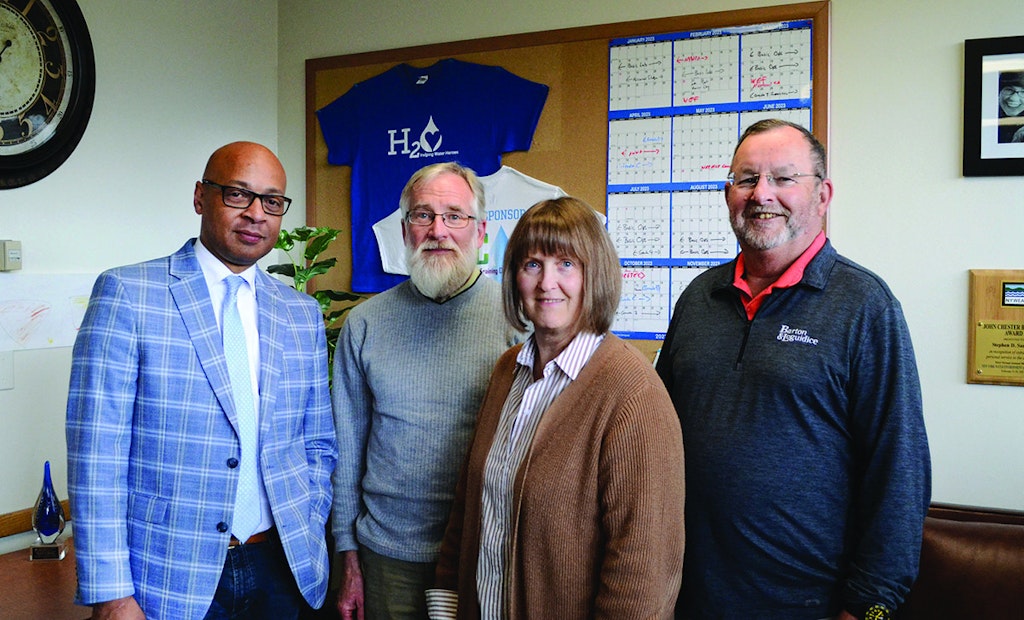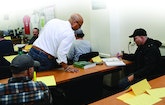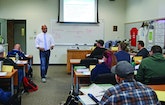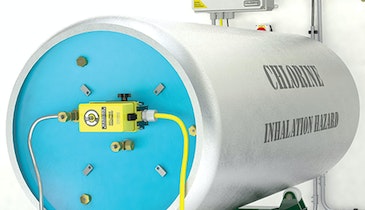
Sanders (left) handles the load of seven wastewater treatment and four drinking water treatment courses with help from secretary Cory Sawyer Scholefield (foreground) and part-time instructors Robert Wither, P.E. (second from left) and J. Michael Coley, P.E., both retired regulators from the New York Department of Environmental Conservation.
Interested in Education/Training?
Get Education/Training articles, news and videos right in your inbox! Sign up now.
Education/Training + Get AlertsStephen Sanders started his career as an operator and troubleshooter. He found his true calling when he became a water and wastewater trainer.
Since 2015, Sanders has been the director and head trainer at the Environmental Training Center at State University of New York Morrisville. There he helps students gain the knowledge and skills to perform effectively on the job, while encouraging them to take a broader view of their profession.
“I always encourage my students as they’re going through class to become a part of something bigger than their plant,” Sanders says. “If all you see every day is just your plant, you might find it difficult to stay in this career.
“There are other things you can get involved in. Maybe that’s the AWWA section in your state, or your WEF Member Association, your Rural Water Association — something where you start meeting like-minded people. You create a network of resources and support that, if you only looked at your plant, you wouldn’t tap into.”
Sanders certainly practices what he preaches: he’s active in his state’s AWWA and WEF organizations and represents the operations and training professions as a member of the WEF board of trustees.
Diverse experience
Originally from Grand Rapids, Michigan, Sanders moved to New York State at age 19 and spent a few years working in the food service and transportation sectors. In 2001 he started work in the lab at the Watchtower Wastewater Treatment Plant in Patterson, a sophisticated facility with a certified lab and a nutrient removal process.
He soon moved over into operations, learning all aspects of the process. “It was super fascinating,” he recalls. “I wanted to know what those lab analyses and numbers meant.”
After two years he joined the contract operations company then called Severn Trent Environmental Services, eventually becoming a shift supervisor at the treatment plant in Carmel, and consulting on his own for startup and operator training at a plant in Brewster.
Next he did water and wastewater contract operations and maintenance and extensive troubleshooting with a smaller company, Allied Pollution Control.
In 2011, while still at Allied, he began teaching part-time at SUNY Morrisville. He later went to work for the Westchester County Department of Environmental Facilities, ending as supervisor of operations at the county’s treatment facility in Yonkers.
In 2015 he took his current position with SUNY Morrisville. He came with experiences at plants of all sizes and with multiple processes: activated sludge, fixed-film, rotating biological contactors, sequencing batch reactors, membrane bioreactors and others.
“I was curious about all the different processes,” Sanders says. “I had the opportunity to run them and troubleshoot them. I tell my classes, ‘I’ve run little package plants the size of this room, and a 100 mgd plant on 20-something acres, and everything in between. This is what I’ve learned over the years, and I’m giving it back to you.’”
Busy training center
New York has strict pre-certification education requirements: “There’s over 100 hours of education you have to get before they let you sit for an exam,” Sanders observes. That means the Morrisville training center is a busy place, seeing roughly 550 operators per year.
Instead of stretching classes over a full semester with evening sessions, the center compresses them into one- or two-week full-time periods. In that time, students can complete a course, take the final exam and return home with a certificate of completion. Sanders believes that approach results in fewer distractions and better retention of course material. During their training, students take facility tours and do lab work under instructors’ supervision.
Sanders handles the load of seven wastewater treatment and four drinking water treatment courses with help from secretary Cory Sawyer Scholefield and part-time instructors Robert Wither, P.E., and J. Michael Coley, P.E., both retired regulators from the New York Department of Environmental Conservation.
As a trainer, Sanders finds he has a greater reach — more opportunity to make a difference — than as an operator. He looks to do more than impart job-related knowledge: “I try to prepare them for careers in water, and I hope I can make their lives better,” he says. “That translates to a little more money and a little more ease in their living. I’m also helping the next generation of water stewards, opening their eyes to the different opportunities that are out there.”
His students are diverse. Typically, several of the roughly 20 members in each class have two- or four-year college degrees. Many are career changers with no little or no industry education or background. Among the most likely to struggle are those moving into wastewater treatment from unrelated jobs with municipalities. They often have a hard time with the math.
“We’ll get someone who worked in the DPW, and all of a sudden they’re asked to run the wastewater plant,” says Sanders. “They get in the class and it’s ‘Oh, my goodness, I have to learn all this stuff now.’ It’s a little bit unfair to them. I take my time with the math. I slow it down. I stay late a number of days to help people as needed. We put a pot of coffee on, roll up our sleeves, get the white board dirty and do a bunch of math.”
He makes sure not to overlook the soft skills — the people skills it takes to move up in the profession: “We have a supervisory class and a management course. I pay a lot of attention to those courses because if we want to recruit and retain people in water careers, we need good supervision. If people feel they’re being treated unfairly or inappropriately on the job, they’re not going to stick around. We can get people in, but to have them stay, we need to create cultures in which people can thrive.”
Advancing the profession
Sanders devotes significant time to industry organizations. He serves on the board of the AWWA New York Section and was the first chairman of its Operators Committee. In 2019, as a member of the New York WEA, he started a diversity, equity and inclusion committee.
“We got it going completely from scratch,” he recalls. “We developed it into a very effective committee that has affected a lot of things NYWEA does. One of our guiding principles is that everyone should have a sense of belonging. We have to look at ourselves and ask, ‘What are some things that make people feel they don’t belong, and that we need to address?’”
The committee treats diversity broadly — ethnicity and gender but also personal background, professional status and position, and more. Initiatives have included training in unconscious bias, along with raising awareness of inequities in the water industry and starting conversations to search for ways to overcome them. The committee also reviewed awards programs and conference presentations, in part to ensure that operators are fairly represented. Sanders has also served on the WEF DE&I Committee.
As a member of the New York State Operator Certification Governance Council, Sanders works to improve the certification program, and that includes reviewing exams. “Recently we noticed that our pass-fail rate had dropped after the exams were changed,” He recalls. “We found that some of the exam questions were unfair. We reviewed the exams and went to another way of putting them together, where we select questions from a question bank.”
The council also oversees reciprocity on certification with other states, an area Sanders sees as needing serious attention. States differ greatly in the levels of training and education required: “You have a state like New York where we require extensive pre-certification education while other states have none of that.”
Sanders asks rhetorically: Does a state with lesser requirements need to increase them? Do states with stricter requirements like New York, Florida, California or Michigan need to lower standards? As a practical matter, lack of reciprocity among states limits operators Sanders observes.
“Let’s say an operator has to move because of family circumstances, and now they can’t get a job and support their family the way they did in the state they left. It’s a real hardship. We need to keep reciprocity on our radar. I work with one of the strategic committees at WEF, and that’s something we’re definitely going to recommit to.”
A need for respect
Along with that, Sanders sees a critical need to rebrand the industry. “I poll all my classes. I ask, ‘For how many of you is this your first career?’ Rarely does a hand go up. When I get around to third, fourth or fifth career, that’s when I see the hands raised. We have to change that. We have to rebrand this field so that people see it as a viable career, right from the start.
“The trades as a whole have taken a hit, but we especially have a problem with regard to operators. How can we recruit people right out of school? How can we get programs going where we visit middle schools, high schools, technical schools and explain these careers to people?
“I ask my classes how they heard about the career. Often it’s, ‘Well, I knew a guy, who knew a guy, who knew a friend.’ There’s never a school guidance counselor talking about water and wastewater operations or maintenance. Our field is aging out, and we have to come up with some different approaches to make it sustainable.”
In his basic classes, Sanders shows a picture of sewer worker Ed Norton from the 1950s TV show The Honeymooners. He asks: “Is Norton a character, or a professional? He’s a character. I need all of you to go out and be professionals because that’s how we’ll attract people to this industry.”








